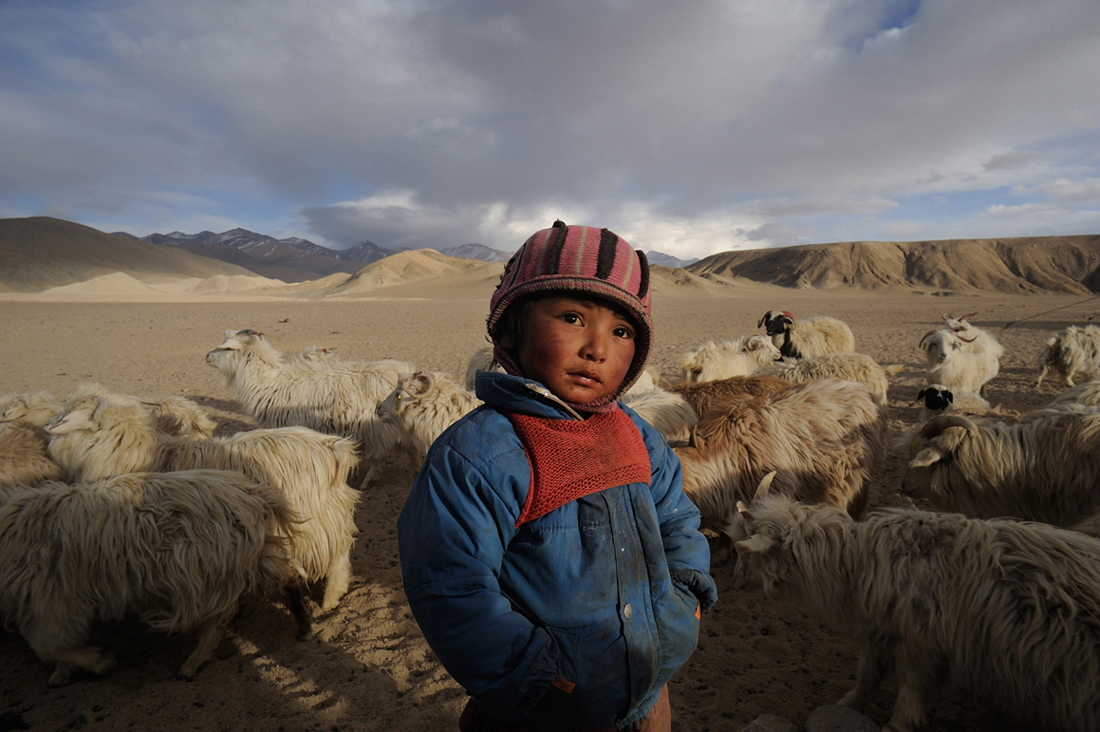People - NOMINEE: Joydip Mitra
Joydip Mitra
Losing Horizon—the Changpa Nomads of Trans-Himalayan India
Support this photographer - share this work on Facebook.
Known as Changpas, or people who migrated from the Tibetan district of ‘Changthang, a very special community resides-- or rather moves around-- the dry mountains of Ladakh in the Indian Himalayas. Rearing goats is their only way of life and for these soft but hairy creatures these shepherds migrate from place to place looking for pastures. The community is rich because their pets yield 'pashmina' wool--a valuable commodity. Once these nomads had little use for money as they rarely strayed even to a secondary town like Leh. They were more used to living by raw nature—using yaks as transport, using yak skin for tents, using yaks’ fat for fuel. But with global warming their landscape is changing. The rivers are either drying up or are changing courses. The Changpas no longer can predict with certainly that they will have grass at a certain place at a certain time. Being excellent adopters the Changpas are finally taking up the rules of contemporary living. They are sending their children to residential schools, and are investing in concrete homes in cities. In a few years there will remain no caravan to cross the brown horizon of Ladakh.
I was trying to discuss those old, free days with Dicky Dolma but the problem turned out that she was laughing more. Wind here has a rare physicality and I lost my balance a number of times, blown by it. That made Dicky more hysteric. Though not sure of her age she told me that she is migrating now for more than half a century—living the course of an entire life right on the wild. Exposure to the elements was written large on Dicky Dolma’s scratched face, though her posture was regal like an inscribed stone. All her life she knew the grammar of surviving on the basics, keeping faith in the protective layers of canvas and yak-skin. Years were just shifting their tent colony from one pasture to the other, leaving a grazing ground for the next as soon as the greenery is chewed up by their herd. Life was so linear then.
Standing at such a temporary colony of the Changpas about forty kilometers from the Ladakhi town of Hanle, and talking to Dicky Dolma, I first came to know about the fear of losing horizon. All around me were enacted another busy, nomadic day—men and women converging into the camp with their herds from far off, grimacing sheep-dogs trying to look fatal, horses stumping on dead gravel. Now and then dust-storm was obliterating everything from vision. Nature looked fierce, uncompromising. Chimneys protruding from ‘robu’—or octagonal canvas tents—were gurgling out occasional smoke into a spotless sky. Inside any robu an oven is always kept burning for continuous supply of ‘gutgut chai’ (tea made with salt and butter) and a lamp is also kept flickering before a framed picture of His Holiness the Dalai Lama. Tinkle from a marching herd seemed like jingle from an active landscape.
Beside Dicky Dolma I could find only a few elders in the entire settlement—the reason being they are left in villages to access a better healthcare infrastructure, and also to look after the very youngs who are no more part of caravans. This is another old Indian story of tradition giving way to common sense and a somewhat sustainable lifestyle, but for the Changpas the mountainscape is certainly shrinking. In another 10 years there might be no migrants all year long in the valleys of Ladakh, and the rivers will feel lonely.
About author:
A freelance photographer based in Kolkata, India, who focuses on social issues defining the greater Indian economy and politics.

